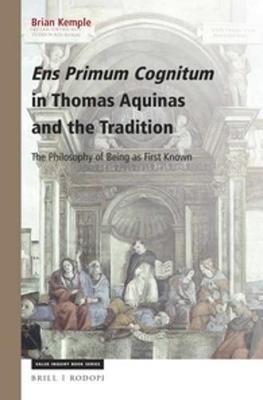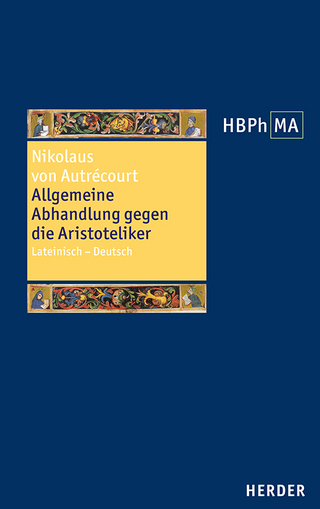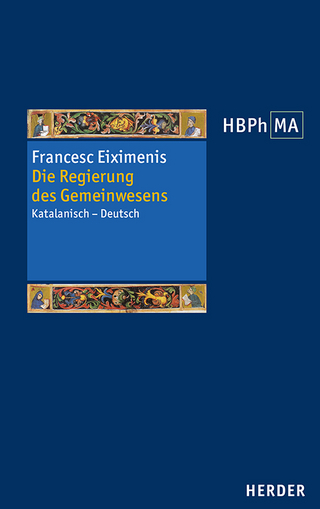
Ens Primum Cognitum in Thomas Aquinas and the Tradition
Brill (Verlag)
978-90-04-35239-1 (ISBN)
Ens Primum Cognitum in Thomas Aquinas and the Tradition presents a reading of Thomas Aquinas’ claim that “being” is the first object of the human intellect. Blending the insights of both the early Thomistic tradition (c.1380—1637AD) and the Leonine Thomistic revival (1879—present), Brian Kemple examines how this claim of Aquinas has been traditionally understood, and what is lacking in that understanding.
While the recent tradition has emphasized the primacy of the real (so-called ens reale) in human recognition of the primum cognitum, Kemple argues that this misinterprets Aquinas, thereby closing off Thomistic philosophy to the broader perspective needed to face the philosophical challenges of today, and proposes an alternative interpretation with dramatic epistemological and metaphysical consequences.
Brian Kemple, Ph.D. (2016), is a recent graduate of the Center for Thomistic Studies at the University of St. Thomas (Texas, USA). He writes on metaphysics, epistemology, phenomenology, and semiotics and is author of Peirce and Heidegger: The Intersection of Phenomenology and Semiotics (Mouton de Gruyter, 2017).
Acknowledgements
Introduction: Escaping the Framework of Modernity
Prefatory Notes on Terminology
Subject and Object, ens naturae and ens rationis
Ideoscopic and Cenoscopic
Concept, verbum mentis, species expressa
Ens ut primum cognitum and ens primum cognitum
Influential Approaches to Ens Primum Cognitum
Objectively and Socially-Constituted Reality
Thomas Aquinas: Intellectus Agens, Verbum Mentis, Relatio
1 The Latin Thomists and Ens Primum Cognitum
1.1 The Early Dispute: Setting the Stage
1.1.1 The Scotistic Foil
1.2 Thomas Cajetan and the Doctrine of Being
1.2.1 Cajetan’s Four Cognitions and Three Abstractions
1.2.2 The Doctrine of Analogy
1.2.3 Conclusion
1.3 John Poinsot, the Nature of Concepts and Ens ut Primum Cognitum
1.3.1 Objectivity and Conceptualization
1.3.2 De Primo Cognito
1.3.3 Objectivity and the Concept of Ens Primum Cognitum
2 Recent Thomistic Interpretations of Ens Primum Cognitum
2.1 Étienne Gilson’s “Metaphysical Realism”
2.1.1 Overcoming Critique
2.1.2 Abstraction and the Nature of the Concept
2.1.3 Realism vs. Idealism and the Question of Ens ut Primum Cognitum
2.2 Jacques Maritain
2.2.1 Maritain on Abstraction
2.2.2 Concept Formation
2.2.3 Maritain on Ens Primum Cognitum
2.3 Conclusion
3 The Intellectus Agens and Concept Formation
3.1 St. Thomas and the Obiectum Intellectus
3.1.1 Ens, ens ut verum, and ens intelligibile
3.1.2 Quod quid est, quid est, and quod quid erat esse
3.1.3 Quidditas rei and quidditas rei materialis
3.2 Intellectus Agens
3.2.1 Illuminare
3.2.2 Digression on Nature: Matter, Form, and Understanding
3.2.3 Abstrahere
4 The Discursion of Concept Formation
4.1 The Discursion of Intellectual Discovery
4.1.1 From Pre-Philosophical Cognition to Philosophical Science
4.1.2 Intellectual Discovery and the Philosophical Sciences
4.2 Formation of the Verbum Mentis
4.2.1 The Derivation of Primary Concepts
4.2.2 Terminus of Intellectual Operation and Intentional Fundamentum
4.2.3 Necessity of Composition
4.2.4 Definition and Quiddity
4.3 A Recursive Analysis of the Species Expressa
4.3.1 True and False Concepts
4.3.2 Species Expressae and Cognition-Dependent Objects
4.3.3 What is Inessential to Things is Essential to Our Concepts
5 Relation and Ens Primum Cognitum
5.1 What is Relation?
5.1.1 Relativa Secundum Esse
5.1.2 Relativa Secundum Dici
5.1.3 The Constitution of Cognition-Dependent Relative Being
5.2 Relations and Objectivity
5.2.1 Intellectual Apprehension of Relations
5.2.2 Interpretation and the Constitution of Objective Realities
5.2.3 “Reality”, “The Real”, and Objective Constitution
6 The Nature of Ens Primum Cognitum
6.1 Summary of Argument
6.2 The Nature of Ens Primum Cognitum
6.2.1 St. Thomas and the Resolutio ad Ens Primum Cognitum
6.3 Conclusion
References Historically Layered
| Erscheinungsdatum | 03.02.2018 |
|---|---|
| Reihe/Serie | Value Inquiry Book Series / Gilson Studies ; 309 |
| Verlagsort | Leiden |
| Sprache | englisch |
| Maße | 155 x 235 mm |
| Gewicht | 614 g |
| Themenwelt | Geisteswissenschaften ► Philosophie ► Philosophie des Mittelalters |
| ISBN-10 | 90-04-35239-2 / 9004352392 |
| ISBN-13 | 978-90-04-35239-1 / 9789004352391 |
| Zustand | Neuware |
| Haben Sie eine Frage zum Produkt? |
aus dem Bereich


